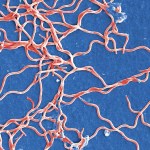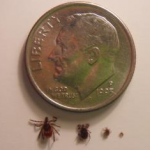Borrelia burgdorferi
In pseudomedicine, fake diseases predominate. Basically, fake diseases are diseases that do not exist in conventional medicine as diagnostic entities because there does not exist sufficient sufficient evidence to support them as one or there exists compelling evidence that they are not. Naturopaths, for instance, like to diagnose people with "adrenal fatigue," which is one of the prototypical "fake diseases." Basically, it involves a constellation of vague symptoms that may include a combination of several of the following: fatigue, inability to handle stress, cravings for salty foods,…
Student guest post by Kyle Malter
In many areas of the country there is a vile blood sucker that lurks in our forests, our parks and even our backyards. What concerns us is not what this creature takes but rather what it leaves in our body after it bites us: corkscrew shaped bacteria called spirochetes and with the name Borrelia burgdorferi. When the bacteria invade our bodies and cause problems along the way we call it Lyme disease.
It is Lyme, not “Lymes” disease, and here’s how it got that name. In the early 1970’s a large number of cases emerged involving children with a…
This is the last of 16 student posts, guest-authored by Jessica Waters.
Climatologists have been warning us about the ongoing and impending consequences of global warming for years. But the results of climate change affect more than just polar bears and penguins - if you live anywhere in the northeastern, north-central or west coast states of the U.S.., you could be at a greater risk for contracting Lyme Disease.
Lyme disease is an infection of the Borrelia burgdorferi bacterium that is spread through black legged ticks (otherwise known as deer ticks) who feed on the…
Mark Pendergrast writes: To kick off this book club discussion of Inside the Outbreaks, I thought I would explain briefly how I came to write the book and then suggest some possible topics for discussion.
The origin of the book goes back to an email I got in 2004 from my old high school and college friend, Andy Vernon, who wrote that I should consider writing the history of the EIS. I emailed back to say that I was honored, but what was the EIS? I had never heard of it. I knew Andy worked on tuberculosis at the CDC, but I didn't know that he had been a state-based EIS officer from 1978…

